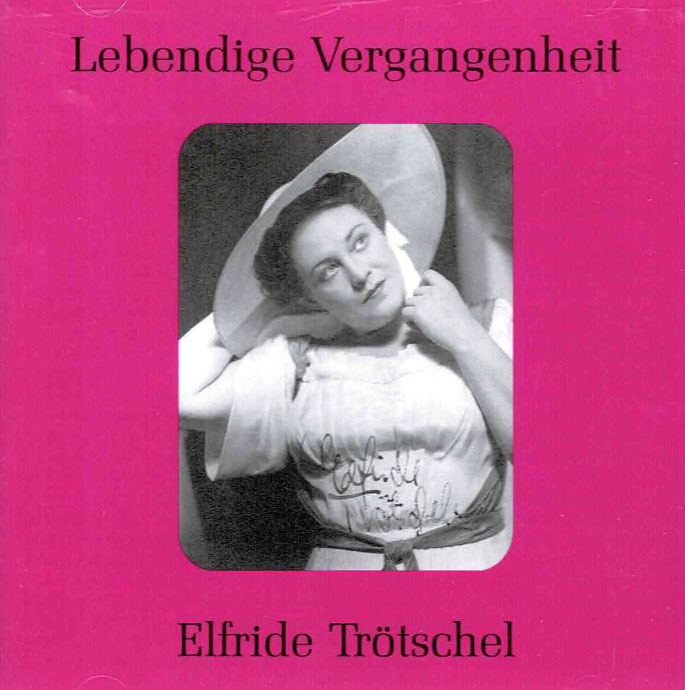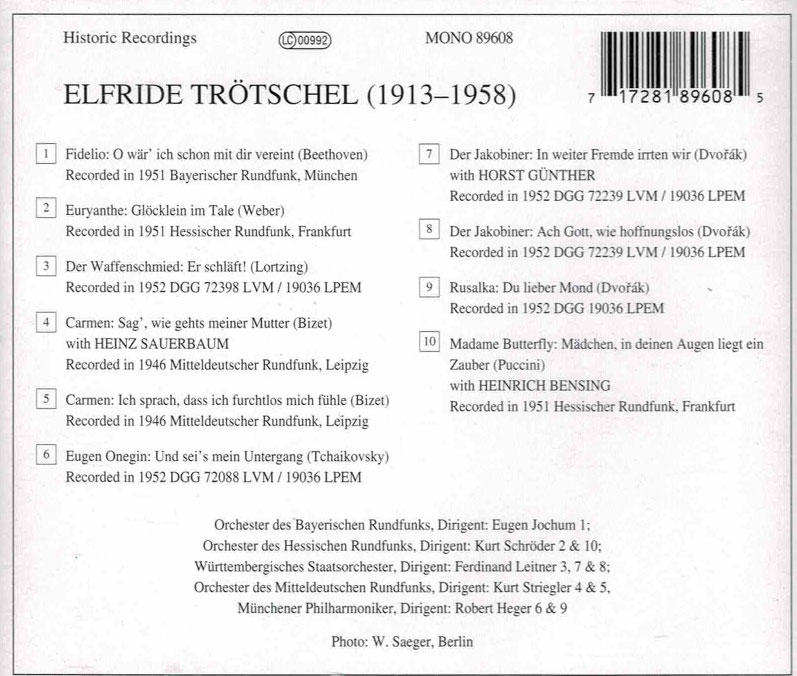Logowanie
Dziś nikt już tak genialnie nie jazzuje!
Bobby Hutcherson, Joe Sample
San Francisco
SHM-CD/SACD - NOWY FORMAT - DŻWIĘK TAK CZYSTY, JAK Z CZASU WIELKIEGO WYBUCHU!
Wayne Shorter, Freddie Hubbard, Herbie Hancock, Ron Carter, Elvin Jones
Speak no evil
UHQCD - dotknij Oryginału - MQA (Master Quality Authenticated)
Chesky! Niezmiennie perfekcyjny
Winylowy niezbędnik
ClearAudio
Double Matrix Professional - Sonic
najbardziej inteligentna i skuteczna pralka do płyt winylowych wszelkiego typu - całkowicie automatyczna
BEETHOVEN, WEBER, BIZET, TCHAIKOVSKY
Elfride Trotschel

- BEETHOVEN
- WEBER
- BIZET
- TCHAIKOVSKY
Lebendige Vergangenheit
A career like that of Elfride Trötschel is no longer conceivable in our time: A beginner who is only 21 years old, with hardly a year of choral experience, is hired as a soloist and for more than a decade is carefully and responsibly given small supporting roles that lead to major roles and finally to an international career. Today it would hardly be possible to step from the chorus into a solo role of any kind, and even a switch from supporting to major roles is frowned upon. But Trötschel's career was not an everyday experience in the 20th century either, except perhaps at the Dresden Hofoper or Staatsoper, which saw the emergence of several global careers that began with a first stage appearance. This is documented in the biographies of Erna Berger, Erik Enderlein, Tino Pattiera, Max Lorenz and Paul Schöffler - to mention only a few prominent names. Elfride Trötschel was born in Dresden on 22 December 1913. Her father, who had studied with Liszt, enjoyed a high reputation in Saxony as a voice- and piano-teacher and also as an organ builder. He did not particularly notice the unusual talent of his youngest daughter because all of his children were musical, but rather as instrumentalists, which interested him more. He did not live to see his daughter's voice develop: he died when she was nine years old. Her music teacher at school paid closer attention. On his advice, Elfride began. taking voice lessons from Sophie Kuhnau-Bernhard in 1928 and was accepted at the opera-chorus school in 1930. On 1 September 1933, she is noted for the first time in the annals of the Dresden Staatsoper as a "candidate for the opera chorus". Paul Schöffler became her teacher in June 1933, arranged an audition for Karl Böhm, and starting on 1 June 1934, Elfride Trötschel was a soloist at the Dresden State Opera. She began her stage career as the 1st Boy in Die Zauberflöte and as the Shepherd in Tannhäuser. On 13 November 1934, she sang Ännchen in Der Freischütz, her first major role. As Lucieta in the Dresden premiere of Die Vier Grobiane (I quattro rusteghi) by Wolf-Ferrari in the same year, she demonstrated her individual stage personality. Her repertoire ranged from the Friedensbote in Rienzi, Nuri in Tiefland, Esmeralda in The Bartered Bride, Oscar in Un hallo in maschera and Nannetta in Verdi's Falstaffto Micaela in Carmen and Marzelline in Fidelio. With her friend and colleague, Christel Goltz, who was a year older, she alternated in several roles, such as the Priestess in Aida and Doris in Kienzl's Kuhreigen. In Humperdinck's classic fairy-tale opera Hänsel und Grete!, she was considered for many years to be an ideal Gretel for Goltz's boyish Hänsel. But while Goltz was often appearing outside Dresden by 1940, Trötschel's only guest appearances until after the war were always with the ensemble of the Dresden opera: at London's Covent Garden Opera in Le nozze di Figaro in 1935, at the Salzburg Festival in Die Zauberflöte and Le nozze di Figaro in 1941 as well as at Florence's Maggio Musicale in Fidelio in 1942. In contrast to Christel Goltz, who clearly tended towards dramatic soprano roles, Trötschel deve loped more in the direction of so-called "interesting characters". In 1942 she sang Adonella in Zandonai's Francesca da Rimini, and in 1944 Terinka in Dvoi'ak's Jakobin. Along with an excerpt from Don Carlos in 1942, Der widerspenstigen Zähmung in 1943 and the Freischütz recorded in July 1944, the radio recording of the performance of Jakobin is one of the first times the voice of the young Trötschel was documented. She again demonstrated her musical and acting agility when musical life resumed in Dresden after the war. In 1947 Smetana's Bartered Bride and Puccini's Madama Butterfly were her first big successes, followed in 1948 by Rusalka as well as Tatyana in Eugene Onegin and Janacek's Kata Kabanova in 1949. The suffering heroines of Slavic opera became her domain, but in 1949 she advanced from Ännchen to Agathe in Freischütz, and on 19 April 1950 she sang Eva in Die Meistersinger, her first - and only - big Wagnerian role. In the meantime there were also ties to Berlin. In 1948 she debuted at the Komische Oper as Eurydice in Orpheus in the Underworld, took over the title role in Die Kluge from Elisabeth Grümmer, and performed at Walter Felsenstein's already legendary hause in 1949 as Micaela in Carmen and in 1950 as Susanne in Le nozze di Figaro. At the end of the 1949-50 season, she ended her engagement in Dresden and moved to the Berlin Staatsoper where she sang Pamina in June 1950. In July 1950 she made a guest appearance as Susanne with the Glyndeboume ensemble ..at the Edinburgh Festival and gained an international reputation. She appeared at the Vienna Staatsoper, in Rome, Paris, Barcelona and Lisbon but was not interested in a travelling career. Beginning in 1950, she focussed more on reinterpreting her repertoire. In Berlin she performed her well-known successful roles of Sophie, Butterfly and Susanne, but also appeared as Pamina, Tatyana and Eva. Her premieres at the Staatsoper in 1951 were Undine and Der Barbier von Bagdad. In 1952 she appeared at the Komische Oper as Agathe in Freischütz and sang the role of Susanne for the last time at the Munich Opera Festival in 1953. She had now become interested, however, in complicated, fractured and inwardly tom stage characters, as seen in her portrayal in Munich of Zdenka in Arabella. In retrospect one can surmise that she was already aware of her serious, incurable illness, knowledge that gave her incredible intense dramatic power. Starting in 1953, she was at her new place of employment, Berlin's Städtische Oper, where she was a compelling performer in a carefully selected repertoire that can hardly be defined in conventional terms. In September 1953, ...


































